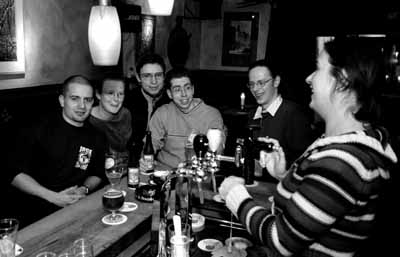“Before I left Rome for Eindhoven, I was told by a friend that I should go to Kaffee de Groot on Thursday nights,” says Alberto Sarrantonio, who is working on his final project at the Mechanical Engineering Energy & Combustion department. His introduction to student association IRCE (International Reception Committee Eindhoven) took place even before he entered the country. Usually, IRCE meet students when they arrive at the train station.

IRCE members (from left to right) Alberto Sarrantanio, Marit Fiege, JosŽ Barros, Mark Bax, Cor Moison enjoying a night at their favourite watering hole, Kaffee de Groot. Photo: Bram Saeys
IRCE was founded about 15 years ago to give foreign students in Eindhoven their own ‘home base’. Also to help them settle in and find their way. Activities include a weekly night in the pub, dinner at the Mensa on Tuesdays and trips to all kinds of interesting places in Belgium, Germany and the Netherlands. IRCE say they ‘welcome the world’.
On arriving, IRCE meet students and take them to their new accommodation and workplace. Many of the Dutch students in IRCE have studied or trained abroad. They have a good idea of what it’s like to be the new guy/girl in a foreign university or company. In the long run, new internationalisation policies at TUE will ensure that every graduate has this experience.
Architecture student Marit Fiege says her contacts at IRCE helped her find a trainee address at Exeter School of Structural Engineering, where she worked on a project measuring the strength of multi-span masonry arch bridges. “It was also nice to know a few people in Exeter before I left,” says Marit.
Alberto continues: “People have been really friendly, helpful and open to me. I even found a new room in a student house where lots of people came to the ‘kijkavond’. Even though so many people were interested and I’m leaving in April, I was still chosen. I’ve also had a lot of support from the department. They had an office and a computer ready for me. They give me everything I ask for. I didn’t expect that much.”
Erasmus physics student José Barros has been in the Netherlands twice before in connection with his studies. “I like it here at the TUE. It’s a good place for physics. People are really motivated, and that makes the work more enjoyable and productive for me. Still, it’s hard if you don’t speak Dutch. You can’t expect your Dutch friends to speak English all the time, it’s too much of a strain. That’s where IRCE comes in. Other foreign students are used to speaking English. It’s also good to meet others in the same situation as yourself.”
Generally, foreign students are eager to learn Dutch, but language classes are often full and are thought to be expensive. “Even with the high price, I would have liked to do a course, but there was no room for me,” Alberto laments. “Now my language training is limited to watching the subtitles of American films and saying ‘drie pilsjes alsjeblieft’ on Thursdays in De Groot.”
Excursions
“My foreign friends have given me a new appreciation of Holland,” says Marit. “I remember José saying our autumn was so beautiful. I just thought it was cold and wet. But his comment opened my eyes. The autumn colours in Eindhoven are beautiful!”
Marit is the driving force behind an excursion to Brugge en Gent this coming weekend (fully booked). A group of IRCE students will visit a brewery, view a castle and explore the canals in Brugge and Gent.
Anyone at IRCE can propose and/or organize one of these monthly excursions. The next one is a cycling tour of Nijmegen’s seven hills and a visit to the Roman museum there. Cycling is a popular activity among foreign students.
“We usually make it to the Deltawerken in Zeeland at least once a year,” says treasurer and physics student Mark Bax. “That’s one of the things someone studying a technical subject in the Netherlands really has to have seen. By the way, all of our excursions are open to any students who want to come.”
There are about 50 students active in IRCE, many of them close to graduate level. IRCE members are from TUE, Fontys Hogescholen and local companies with foreign trainees. “We are quite a mixed group, not all of us are extremely theoretical or technical. For example, the physiotherapy course at Fontys attracts quite a few foreign students,” says Mark./.
Anyone interested in one of the excursions can sign-up at the IRCE site: www.tue.nl/IRCE.




